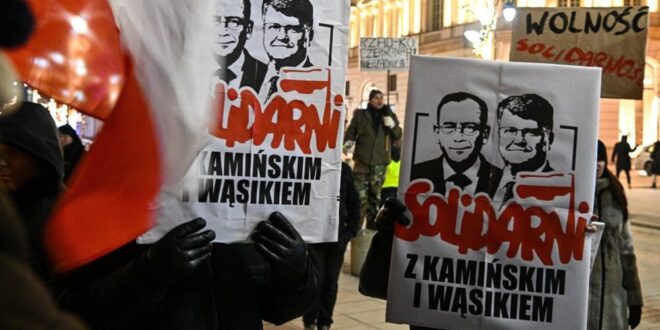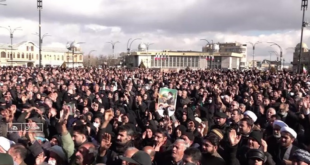Two top PiS politicians, one of them the former interior minister, are jailed, in what could become a major battleground for the former ruling party as it attempts to force early elections.
On Wednesday morning, the former Polish interior minister Mariusz Kaminski and his ex-deputy, Maciej Wasik, woke up in prison in eastern Warsaw after the police had spent the better part of the previous day trying to arrest the duo to serve sentences for crimes they have already been found guilty of, but for which the opposition claim they should not be imprisoned.
On Tuesday, the police tried to implement a court order to arrest the two Law and Justice (PiS) politicians, who were sentenced in December 2023 to two years in prison for abuse of power committed in 2007 while running the Central Anti-Corruption Bureau (CBA), but the move turned into something out of a political thriller.
With PiS politicians protesting the arrest warrants, and Kaminski and Wasik themselves arguing they are “political prisoners”, the PiS-allied President Andrzej Duda invited the two to a ceremony at the Presidential Palace, taking photos with them as police officers were busy searching their homes in another part of the Polish capital.
Kaminski and Wasik ended up spending the whole day at the Presidential Palace. And it was only in the evening, at around 19:30, that the police decided to enter the palace and arrest the two.
Duda and his supporters point to the fact that the two politicians were pardoned by the president shortly after the populist-conservative PiS came to power in 2015. However, the Supreme Court, the new government that won the October election and legal experts argue that the president’s act has no legal consequences, as the original 2015 court ruling had not yet been made final (only the December 2023 ruling was final).
This is one of several flashpoints many had foreseen when the alliance of three opposition parties won Poland’s October 15 general election and promised to reverse many of what opponents regard as PiS’s anti-democratic policies.
The stakes for the PiS camp and Poland could not be higher. On the one hand, with the new government setting up three separate parliamentary commissions to investigate potential abuses by the previous PiS government – including the use of the Pegasus surveillance software to spy on political opponents – many of its politicians fear going to jail themselves eventually. More immediately, observers are warning that PiS could try to use the arrests of Kaminski and Wasik to force an early election just months after it lost the previous one.
‘Political prisoners’
Kaminski and Wasik were elected to parliament on the PiS list in the October general election, but in December the two politicians were convicted for orchestrating a scheme, including the use of intelligence agents and falsifying of documents, designed to bring down a political opponent. The two argued they were “fighting corruption”; the judge ruled the means used were illegal. The sentence is final.
Szymon Holownia, the marshal of the Sejm, declared their mandates were invalidated by the court ruling and terminated their voting privileges. However, PiS insists the two should remain in parliament and can vote.
A chamber of the Supreme Court ruled on Wednesday that Kaminski was indeed no longer an MP after Kaminski had appealed Holownia’s decision.
Kaminski and Wasik themselves had announced their intention to vote during a new parliamentary session that was set to begin on Wednesday, but which Holownia has since postponed to next week.
Crucially, parliament has to vote on a new budget in this coming session, and the new government has only until the end of January to bring the budget to President Duda for approval. Duda, who cannot veto the budget, can nevertheless send it to the Constitutional Tribunal in the event he has legal doubts and thus delay its adoption. Experts say Duda could invoke the exclusion of the two PiS politicians from voting as a reason to send the budget to the Constitutional Tribunal, which the EU regards as an illegitimate and politicised body after PiS appointed its allies to it.
In such a scenario, Duda could eventually claim the deadline for adopting the budget has been breached and call for an early parliamentary election.
While both sides of the political camp await the next developments, PiS has been mobilising to push a narrative in which it is depicting the attempts by the new government to “clean up” after PiS as totalitarian acts, with the former ruling party now a persecuted minority.
There was a similar flashpoint when the new government in December changed the leadership of public media channels, which during PiS’s eight years in power had become government mouthpieces. PiS and its friendly journalists organised occupations of some of these media institutions, while hundreds of supporters protested outside.
On Tuesday night, PiS politicians, including leader Jaroslaw Kaczynski, showed up at the police station and called on their supporters to join them. Hundreds also protested in front of the Presidential Palace. Later that evening, Kaczynski went to the detention centre where Kaminski and Wasik are being held. On Wednesday morning, some Polish media reported Kaminski had gone on hunger strike.
“It is an unprecedented scandal that Mariusz Kaminski and Maciej Wasik are in prison,” Kaczynski told supporters. “They are the first political prisoners in Poland since 1989. Those who are responsible for this will suffer the consequences.”
Jacek Sasin, a former PiS minister, called the arrests a “coup d’etat”, while PiS euro-parliamentarian Zdislaw Krasnodebski described Tuesday night’s events as a “police attack on the Presidential Palace.”
Key politicians in PiS are now calling on supporters to protest in Warsaw on Thursday afternoon, and local structures of the party have been engaged for days in organizing transport from across the country for those willing to attend.
According to a press statement issued on Wednesday morning, PiS representatives say they expect tens of thousands to attend.
 Eurasia Press & News
Eurasia Press & News




